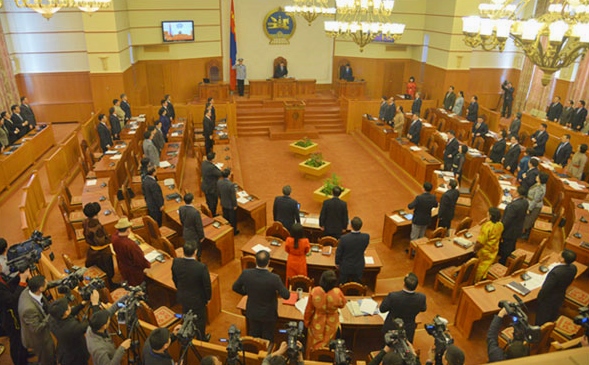
Foreign Policy Implications of Mongolian Crony Democracy
Publication: Eurasia Daily Monitor Volume: 11 Issue: 47
By:

Though considered a healthy—albeit developing—democracy (https://www.osce.org/odihr/elections/105158; https://www.santmaral.mn/en/publications), Mongolia has in recent years become dominated by the competing interests of its political and business factions, whose collective actions undermine the country’s democratization trends as well as complicate Ulaanbaatar’s foreign policy. For now, Mongolia resides in a stable and largely friendly neighborhood, its democratic system is peaceful, and it boasts valuable natural resources. But the intense competition among its domestic political and business factions welcomes assertive Russian interests, increases Chinese dominance, and discourages Western investors.
Recently, powerful businesses and wealthy entrepreneurs have come to dominate Mongolia’s major political parties—the ruling Democratic Party (DP) and the opposition Mongolian People’s Party (MPP)—as well as the parliament and the executive branch. This business sector dominance encourages profit-maximizing competition among party-affiliated businesses and discourages any legislative or judicial efforts to constrain their influence in politics. Such competition appears to slow down under coalition governments (e.g., 2004–2008 and 2008–2012), but expands unchecked when one party establishes a majority government (e.g., 1996–2000, 2000–2004, 2012–2016). Under a majority government in Mongolia, the ruling party routinely cancels the previous government’s projects, names party-affiliated politicians or businessmen to key posts in the government bureaucracy and state-owned enterprises, and influences judiciary and law enforcement organizations. For instance, today, 74 members of parliament (out of 76) hold wealth equal to 7.6 percent of GDP, and only 4 members of parliament account for 64 percent of this net wealth (https://www.themongolist.com/blog/parliament/79-the-wealth-of-parliament-redux.html).
Given the inherent economic uncertainties in Mongolia’s commodities markets and rates of foreign investment, profit-maximization strategies appear overtake all other political issues that divide the country’s political and business factions. Consequently, the ideological lines between Mongolian political parties have become blurred, and these parties remain vulnerable to ever-changing short-term coalitions or dissolutions based on convenient business deals. Since 2005, the natural resource boom has intensified this competition by creating expectations of business opportunities (e.g., the growing market need for supply and support businesses) and the influx of funds (e.g., investment, fees, royalties). And this domestic phenomenon, in turn, affects Mongolia’s foreign relations with Russia, China and the Western democracies.
Mongolia’s historical sensitivity to China provides a favorable climate for Russian business groups. Although Russia’s geo-strategic interests in Mongolia have declined somewhat since the fall of Communism, Russian business groups have been influential in reviving interest in Mongolia. A recent interview by Russian goldmine owner Sergei Paushok, who contested Mongolia’s imposition of a windfall profit tax, triggered quick debates among the country’s politicians regarding policies to attract Russian business (Zuunii Medee October 26, 2013; Medee.mn, October 28, 2013).
Another example of Russia’s powerful impact on Mongolian internal politics has been the railway debate—whether to use the Chinese standard gauge domestically to link Mongolia’s mining sites to the Chinese rail network, or the Russian standard gauge to link to the Trans-Siberian Railroad (Asia Pacific Memo, February 12, 2013). While the parliament decided on the Russian standard gauge in June 2010, Mongolia’s various business factions are still debating and attempting to cancel each other’s projects to overturn this decision. Of course, the Russian side has been supportive of those Mongolian factions advocating the Russian standard gauge. But as a result of this increased Russian interest and influence, Mongolia lost $188 million in assistance from the US Millennium Challenge Account, which in turn discouraged some Western mining companies (e.g., Khan Resources in uranium mining) from investing in the country and complicated the bidding process of the Tavan Tolgoi coking coal mine (https://www.eai.or.kr/data/bbs/eng_report/2009052017262087.pdf; https://en.mongolianminingjournal.com/content/43374.shtml). Finally, the Mongolian economy is still vulnerable to Russian petroleum exports (see EDM, November 21, 2012). Therefore, growing Russian business interests will certainly reduce Ulaanbaatar’s ability to make independent decisions on major mining and infrastructure projects if Mongolian political parties and their business backers continue to allow themselves to be coopted in this way.
China, with its vast manufacturing base, remains the primary outlet for Mongolian natural resources, as well as a transit corridor for Mongolia’s entry into other East Asian markets. However, Mongolia’s ability to benefit from the growing Chinese economy is being constrained by two major factors. One is the prevailing, although changing, anti-Chinese sentiment among Mongolians. The exclusion of Chinese bidders in major mining investment projects and the foreign investment law excluding foreign state-owned enterprises were mostly driven by Mongolia’s traditional anti-Chinese sentiments (see EDM, January 17, 2013). The other factor is factional fighting within domestic politics to advance party-affiliated business interests while cancelling previous deals with Chinese enterprises made by opposing political groups. Because China is not dependent on Mongolia’s resource exports (esp., coal), Mongolia’s short-term political populism and factional competition endangers the country’s economic and trade relations with China, which, in turn, hardens China’s position in subsequent economic negotiations. To assuage Chinese concerns over economic uncertainty, succeeding governments in Ulaanbaatar will likely need to commit to strategic partnership agreements and to promise more opportunities for Chinese state-owned enterprises. For instance, long-term coal export quotas and investment opportunities for Chinese energy companies were agreed during the Prime Minister Norovyn Altankhuyag’s recent visit to Beijing (Press Release of the Government of Mongolia, October 25, 2013). But these deals will likely again become vulnerable as the balance of political power in Ulaanbaatar changes or if Mongolian populist politicians again start to invoke anti-Chinese rhetoric.
The turbulent competition among Mongolian political and business factions, the success of populist politicians, and the growth of domestic civil society activists and environmental movements, as well as growing interests of Russian and Chinese state-owned enterprises in Mongolia are increasingly turning away Western investors. In particular, government agreements with Anglo-Australian Rio Tinto and Canadian Ivanhoe Mines in 2010 are still under pressure from the Mongolian side and becoming the hostage to its domestic politics (https://economy.news.mn/content/170495.shtml). Indeed, meetings between Mongolian political leaders and high-level dignitaries from member countries of the Organization for Economic Cooperation and Development (OECD) frequently revolve around Mongolia’s mining investment environment. However, the damaging conflicts between its various political-business factions, as well as public discontent over corruption and domestic social-economic challenges—especially related to the mining sector—are almost certain to continue to complicate Mongolia’s foreign policy decisions.




